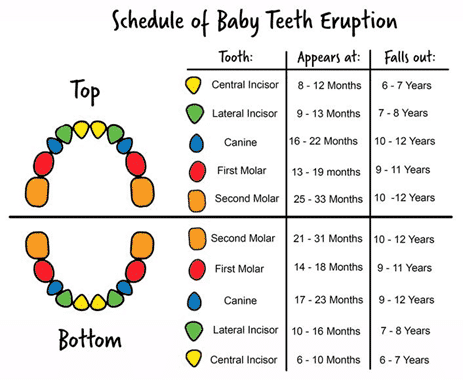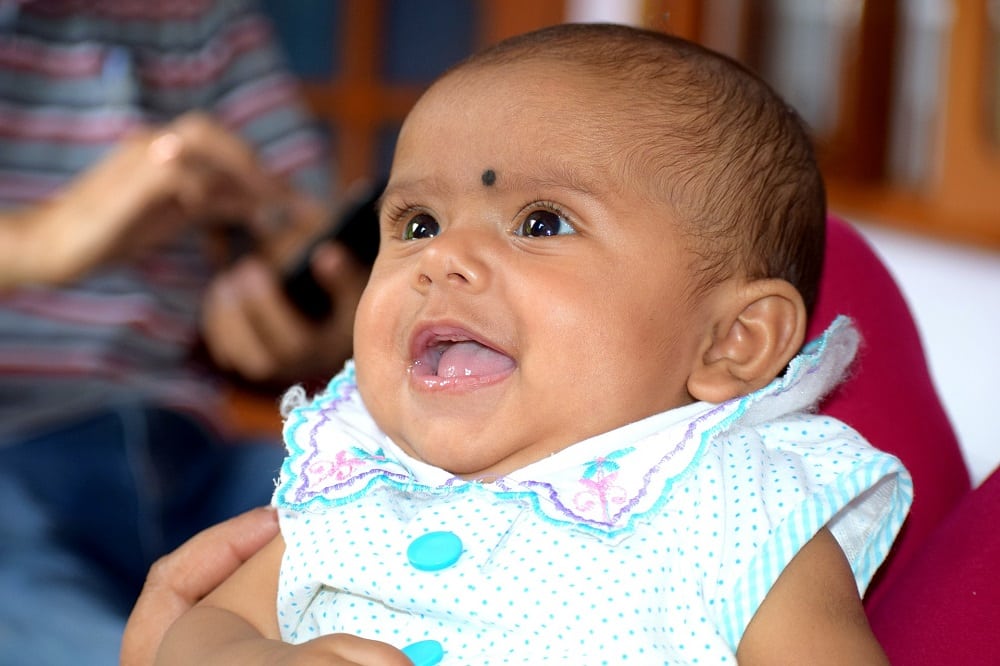Although oral health is improving in England, the oral health survey of 5 year olds in 2019 showed that just under a quarter have tooth decay (see the National Dental Epidemiology Programme for England, 2019). Each child with tooth decay will have on average 3 to 4 teeth affected. The risk of tooth decay increases as a child’s diet starts to include foods and drinks other than breast milk or formula, depending on the free sugar content.
Here are some great videos to help
When should I first take my baby to the dentist?
You should take your baby to the dentist at 6 months of when the first tooth erupts and then every 6 months after that.
When should my baby’s teeth come in?
Babies teeth can come in at any time but here is a rough guide.
Causes of tooth decay
Too many sugary drinks and foods between meals are the main cause of tooth decay. The average can of fizzy juice contains around seven teaspoons of sugar. Imagine putting thirteen sugars in your tea. A chocolate bar may have as many as six or even more teaspoons of sugar.
Tooth brushing – Stage 1 – baby
At first your baby may find it a bit strange but will soon get used to the soothing feeling. Find a place that is comfortable and safe for baby. Always supervise tooth brushing and never leave a baby or small child alone with a toothbrush or toothpaste.
Which toothbrush?
Use a toothbrush with a small head and soft bristles.
Which toothpaste?
At home, encourage healthy habits and use a toothbrush and toothpaste with at least 1000 (parts per million (ppm) fluoride.
How much toothpaste?
For children under three years of age use a smear of fluoride toothpaste on to a dry brush.
Tooth brushing positions
- in a baby chair or high chair on a changing mat in the bath
- sitting in a pram or buggy on your knee
When to brush
- pick a time that is convenient to you by thinking of your child’s daily routine, perhaps at playtime or bath time. Eventually you can move on to a morning and night time routine.
Tooth Brushing – Stage 2 – toddler
A growing child needs teeth to smile and eat with, and to give them confidence. Establishing a good oral care routine from early childhood is important and can be supported by parents and carers
Which toothbrush?
Use a toothbrush with a small head and soft bristles.
Which toothpaste?
For children aged three years and above, use a pea-sized amount of at least 1000 (parts per million (ppm) fluoride toothpaste.
When to brush
At home, children’s teeth should be brushed last thing at night before bedtime and on at least one other occasion. As more teeth come through, it is important to develop a system of brushing that ensures that all surfaces of the teeth are brushed thoroughly each time.
Tooth brushing – Stage 3 – Pre-school
Assist tooth brushing until about seven years of age by then their coordination will be fully developed and they will be able to brush properly. Children should be encouraged to do some of the tooth brushing skills. Remember to encourage your child. Praise will often get results.
Which toothbrush?
Use a toothbrush with a small head and soft bristles.
Which toothpaste?
For children aged three years and above, use a pea-sized amount of at least 1000 (parts per million (ppm) fluoride toothpaste.
When to brush
At home, children’s teeth should be brushed last thing at night before bedtime and on at least one other occasion. As more teeth come through, it is important to develop a system of brushing that ensures that all surfaces of the teeth are brushed thoroughly each time.
Drinking from a cup
Introduce a cup at around six months and aim to have your baby no longer drinking from a feeding bottle by their first birthday. Learning to drink from a cup can be messy and fun but it’s all part of growing up and using a cup is better for your baby’s teeth. Your child needs to learn to sip, not suck. If the cup has a lid make sure the water can drip out when turned upside down, this is known as a free-flow cup. Using a free-flowing spouted cup is the first stage of your baby’s progress to an open cup. Valve cups (non-spill types) are not recommended. The sucking motion can lead to speech problems.
Never give sugary drinks in bottles as this can cause very rapid tooth decay.
There’s some great information here
More Information from our website:
- Watch our fun video about looking after your teeth and download our PDF on teething and looking after first teeth







